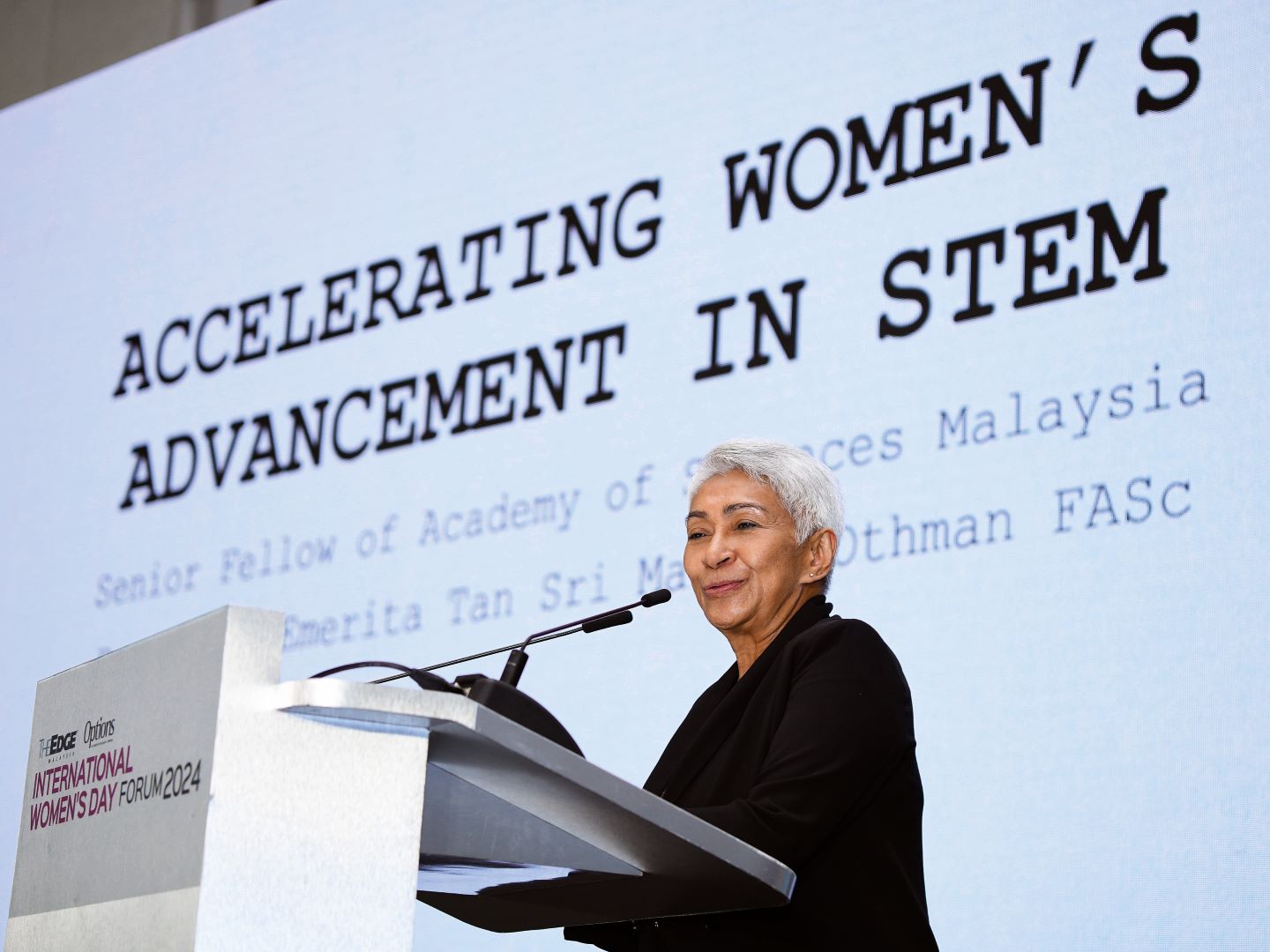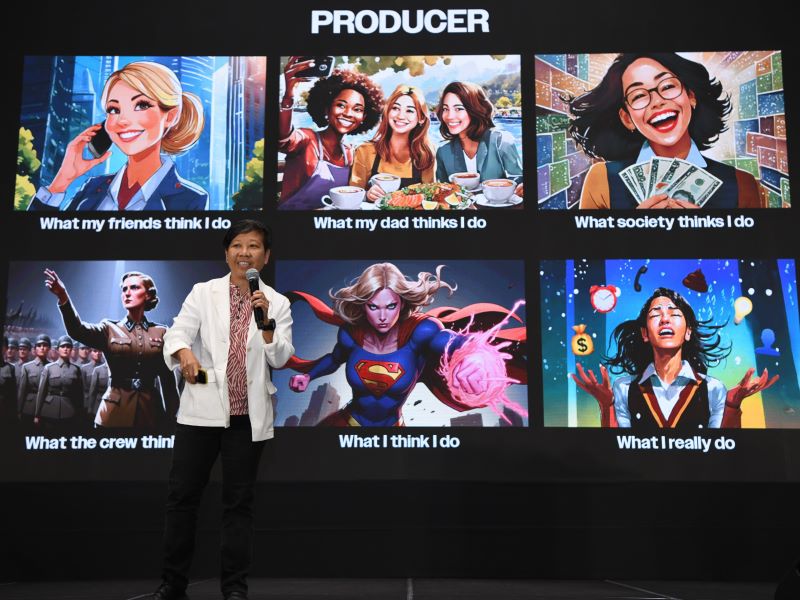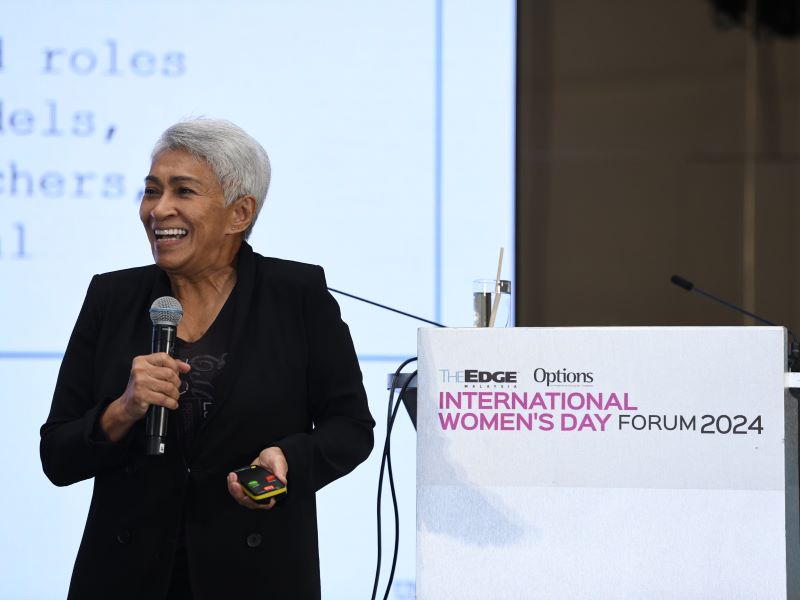
Professor Emerita Tan Sri Dr Mazlan Othman reveals that only 20% of women make up the 400-strong members of the Academy of Sciences Malaysia (All photos: Low Yen Yeing/The Edge)
During the inaugural Options forum held in conjunction with International Women's Day on Mar 11, founder of Red Communications Lina Tan and Professor Emerita Tan Sri Dr Mazlan Othman emphasised the importance of mentors and role models at the decision-making table as more women are being passed up for opportunities. Here's a recap of their speech.
Lina Tan
Founder of Red Communications
Malaysia’s television industry, a timid enterprise dependent on formulas and genres, can be unexpectedly retrograde when it comes to women and girls. This realisation came to Lina Tan more than 20 years ago, a successful producer at the time, when she was shooting an advertisement for a detergent.
“There is simply no place to see or emulate someone who looks like me. Why are we not telling our own stories? Why are we not talking about Malaysian issues?” she laments.
Female-driven movies should be accepted as a matter of course rather than aberrations, asserts Tan, who eventually formed Red Communications in 1999, a production house that focuses on women-centric and socially conscious content while cultivating homegrown talent. It was at that time that she pitched 3R (Respect, Relax, Respond), a programme aimed at empowering young women on a variety of topics, to Datin Paduka Marina Mahathir. Starring Azah Yasmin Yusof, Low Ngai Yuen and Rafidah Abdullah as its bright young emcees, the show ran for 15 years and became one of the most successful and memorable productions of Red Communications.
“When I first brought up the idea of 3R to TV stations, they asked, ‘Who are they? Why they not pretty one?’ We still have a traditional approach to how women should be perceived onscreen. 3R dealt with issues from sexual harassment to a stalker boyfriend, and every episode was handled differently and meticulously,” says Tan.
Viewership grew but the show, which groomed many young women into successful leaders today, was still lacking in funding. “We were advised to fund 3R differently — fund it with sponsors who believed in the cause. It wasn’t easy but the following year, Kotex called us. We were happy, of course, because we could craft an important story about periods. But one day, I got a call from TV3 and they said, ‘Lina, you know sanitary napkins are banned on air, right?’ It was 2001. That can’t be! Thankfully, the response was good, ratings went up, the show wasn’t pulled, and guess what, every [feminine hygiene] brand in the country wanted to work with us after that.”
Precisely because representation is so important a force in self-identification, women need to be seen as more than reductive tropes onscreen. It also feels good to know that individuals in our communities are being paid to craft their own narratives.
“The people in front of the camera are just as important as those behind it. I’ve been trying to push many female directors forward but they often doubt themselves and say, ‘I’m not sure’ or ‘I don’t think I can’. Yes, [TV] is still a very male-dominated industry. When Umi [Salwana Omar] directed From Saga with Love, she had to explain to her male colleague, the director of photography, and justify why she wanted to change a certain camera angle or direction. Women just have to push through and encourage each other,” she says.
Persistence is not a foreign concept to Tan, who was diagnosed with stage two breast cancer in 2011 but decided to keep herself productive and healthy by taking up cycling. Defying all odds, she rode 80km around Penang, mostly in the rain, just after her second chemotherapy session. “Perhaps, this is the way the universe is asking me to slow down,” adds Tan, who has been cancer free for eight years.
These days, she surrounds herself with meaningful initiatives, like advocating the art of storytelling through Suatukala, a community outreach programme she co-founded with writer Karina Bahrin, artist Alex Lim and event organiser Liz Tajuddin, by bringing teachers and students in Langkawi together. Otherwise, you may find her gazing at yet another painting inside Temu House, a creative space she set up with architect Lillian Tay where artists and minority and women’s groups can meet face to face.
Professor Emerita Tan Sri Dr Mazlan Othman
The country’s first astrophysicist and senior fellow of the Academy of Sciences Malaysia
Hidden Figures, an Academy Award nominee for Best Picture on how three African American women at NASA helped put a man into orbit, is more than just a biographical drama that celebrates unsung heroines. The title is a metaphor for a world that could be so much better if we allowed everyone to have an equal part and say in its improvement.
Professor Emerita Tan Sri Dr Mazlan Othman referenced the film for a reason during her speech. Once a woman is given a chance, her genius becomes too apparent to ignore. But first, she needs to be seen.
To date, only 20% of women make up the 400-strong members of the Academy of Sciences Malaysia, and just a handful are senior fellows like Mazlan. Gender norms, a traditional family upbringing and a perception that careers in science, technology, engineering and mathematics (STEM) are less rewarding have deterred many young aspirants from pursuing such paths. This is a problem plaguing countries worldwide, including developed nations that assume girls are not genetically or innately gifted in the field. And we unwittingly perpetuate these stereotypes.
One way forward is to nurture more role models. The visibility of women at the top, or in this case, in exciting areas of science, demonstrates that it is possible for others to get there too. Why set aside loftier dreams for something everyone seems to be telling you is more realistic?
“When people ask if I could give a talk about women in science, I always tell them, ‘Can I recommend another female candidate?’ Why am I still being seen as ‘that scientist’? My name still comes up after years. Tak basi lagi ke? (Is it not stale?) Something must be very wrong. The media, I’m sorry, is not giving enough attention to science. And it needs to take active action to promote leadership roles and tell more success stories about women,” says the country’s first astrophysicist.
“Lina, don’t you want to do a movie about women in science? That is my challenge to you,” cajoles Mazlan, echoing Tan’s sentiment about the dearth of female representation on TV and the big screen.
Equality in the workplace still has a long way to go as women constantly need to dodge landmines, fight disparity and not burn out in the process. An empathetic leader, who approaches work with a deep sense of purpose and sees your shortcomings as strengths, not stigma, is paramount. Power is amplified when it is shared.
“I used to bring my children to work when I was working for the United Nations. Of course, there are people who thought I was not coping [and juggling my responsibilities] well, and there must be some weakness in my life. But the more people thought that, the more I wanted to bring my children along. First, I wanted them to know what I do. Second, I wanted to be that kind of boss, a role model, who wouldn’t get angry or look down on you just because you brought your child to work,” says Mazlan.
Such practice also reinforces her point of instilling an interest in STEM among children from a young age, and not during their teens, because “they have probably already made up their minds on what they want to do”.
Women get science, and as Mazlan often expresses her equal love for astronomy and the arts, these brilliant minds can be creative too. They just need others to believe them.
This article first appeared on Mar 25, 2024 in The Edge Malaysia.




